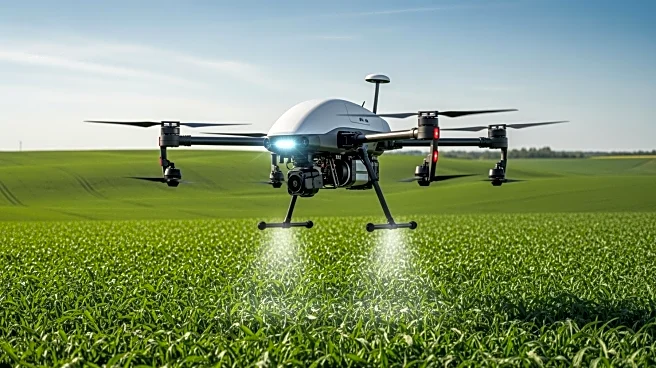What's Happening?
The Ministry of Agriculture, in partnership with the Food and Agriculture Organization (FAO) of the United Nations, conducted a technology field demonstration at the CARDI Agricultural Field Station. This
event aimed to address the declining crop productivity due to soil depletion by introducing precision agriculture tools. The demonstration, part of World Food Day celebrations, showcased portable digital soil scanners and advanced drone technology. Ika Fergus, FAO’s National Correspondent, highlighted the urgent need for digital solutions to reverse declining yields and enhance food security. Fergus noted that continuous cropping without adequate nutrient replenishment has led to severely depleted soil, affecting crop yields. The showcased soil scanners provide real-time data on soil nutrient levels, enabling farmers to make informed decisions on fertilizer application. Additionally, agricultural drones demonstrated efficient field spraying capabilities, crucial for building climate-resilient and sustainable food production systems.
Why It's Important?
The introduction of digital agriculture technologies is significant for addressing the productivity crisis in the agricultural sector. By optimizing production systems with climate-smart innovations, the initiative aims to enhance food security and build competitive agrifood systems. The FAO's involvement in implementing Technical Cooperation Programmes in Antigua and Barbuda underscores the importance of modernizing agriculture and fisheries sectors in response to climate change. These efforts are supported by various funding sources, including international partners, and are crucial for building resilience and ensuring sustainable food production. The adoption of these technologies could lead to increased crop yields, benefiting farmers and contributing to the nation's food security.
What's Next?
The FAO continues to implement diverse Technical Cooperation Programmes in Antigua and Barbuda, focusing on resilience building, food security enhancement, and sector modernization. These programmes involve collaborations with international partners like the Government of Mexico and the Global Environment Facility. The ongoing efforts aim to support farmers in adopting digital innovations and climate-smart solutions, potentially leading to improved agricultural productivity and sustainability. The success of these initiatives could encourage further investment in digital agriculture technologies and foster a more resilient agrifood system.
Beyond the Headlines
The shift towards digital agriculture technologies highlights the broader implications for sustainable farming practices. By addressing soil depletion and optimizing resource use, these innovations contribute to environmental conservation and climate change mitigation. The focus on data-driven decision-making represents a cultural shift in traditional farming methods, emphasizing the importance of technology in modern agriculture. This development could lead to long-term changes in agricultural practices, promoting sustainability and resilience in the face of environmental challenges.









